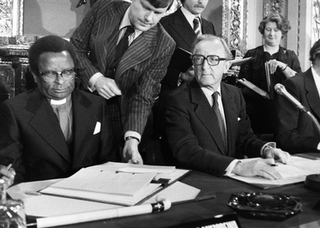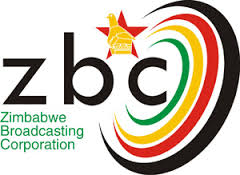Oligarchy is a form of power structure in which power rests with a small number of people. These people may be distinguished by nobility, wealth, education or corporate, religious, political, or military control. Such states are often controlled by families who pass their influence from one generation to the next, but inheritance is not a necessary condition of oligarchy.

Rhodesia was an unrecognised state in southern Africa from 1965 to 1979, equivalent in territory to modern Zimbabwe. Rhodesia was the de facto successor state to the British colony of Southern Rhodesia, which had been self-governing since achieving responsible government in 1923. A landlocked nation, Rhodesia was bordered by South Africa to the south, Bechuanaland to the southwest, Zambia to the northwest, and Mozambique to the east.

Zimbabwe, officially the Republic of Zimbabwe, formerly Rhodesia, is a landlocked country located in Southern Africa, between the Zambezi and Limpopo Rivers, bordered by South Africa, Botswana, Zambia and Mozambique. The capital and largest city is Harare. The second largest city is Bulawayo. A country of roughly 14 million people, Zimbabwe has 16 official languages, with English, Shona, and Ndebele the most common.

The foreign relations of Zimbabwe emphasize a close relationship with the People's Republic of China and South Africa, nations with close economic ties to Zimbabwe.

Zimbabwe Rhodesia was an unrecognised state that existed from 1 June 1979 to 12 December 1979. Zimbabwe Rhodesia was preceded by an unrecognised republic named Rhodesia and was briefly followed by the re-established British colony of Southern Rhodesia, which according to British constitutional theory had remained the proper government after Unilateral Declaration of Independence (UDI) in 1965. About three months later, the re-established colony of Southern Rhodesia was granted internationally recognised independence within the Commonwealth as the Republic of Zimbabwe.

Joshua Mqabuko Nyongolo Nkomo was a Zimbabwean revolutionary and politician who served as Vice-President of Zimbabwe from 1987 until his death in 1999. He founded and led the Zimbabwe African People's Union (ZAPU) from 1961 until it merged in 1987 with Robert Mugabe's Zimbabwe African National Union (ZANU) to form ZANU–PF.

The national flag of Zimbabwe consists of seven even horizontal stripes of green, gold, red and black with a white triangle containing a red 5-pointed star with a Zimbabwe Bird. The present design was adopted on 18 April 1980, when Zimbabwe won its independence from the United Kingdom. The soapstone bird featured on the flag represents a statuette of a bird found at the ruins of Great Zimbabwe. The bird symbolises the history of Zimbabwe; the red star beneath it officially stands for the nation's aspirations but is commonly thought to symbolise socialism, and the revolutionary struggle for freedom and peace. The design is based on the flag of Zimbabwe's ruling party, the Zimbabwe African National Union – Patriotic Front.

The Lancaster House Agreement, signed on 21 December 1979, declared a ceasefire, ending the Rhodesian Bush War; and directly led to the creation and recognition of the Republic of Zimbabwe. It required the imposition of direct British rule, nullifying Rhodesia’s 1965 Unilateral Declaration of Independence. British governance would be strictly proscribed to the duration of a proposed election period; after which independence would follow. Crucially, the political wings of the black nationalist groups ZANU and ZAPU, who had been waging the escalating, and increasingly violent insurgency, would be permitted to stand candidates in the forthcoming elections. This was however conditional to compliance with the ceasefire and the verified absence of voter intimidation.

The Zimbabwe Broadcasting Corporation (ZBC) is the state-controlled broadcaster in Zimbabwe. It was established as the Rhodesian Broadcasting Corporation (RBC), taking its current name in 1980. Like the RBC before it, the ZBC has been accused of being a government mouthpiece with no editorial independence.

The Kingdom of Mapungubwe (c.1075–1220) was a medieval state in South Africa located at the confluence of the Shashe and Limpopo rivers, south of Great Zimbabwe. The name is derived from either TjiKalanga and Tshivenda. The name might mean "Hill of Jackals". The kingdom was the first stage in a development that would culminate in the creation of the Kingdom of Zimbabwe in the 13th century, and with gold trading links to Rhapta and Kilwa Kisiwani on the African east coast. The Kingdom of Mapungubwe lasted about 80 years, and at its height the capital's population was about 5000 people. The Mapungubwe Collection is a museum collection of artifacts found at the archaeological site and is housed in the Mapungubwe Museum in Pretoria.

The Senate of Zimbabwe is the upper of the two chambers in Zimbabwe's Parliament. It existed from independence in 1980 until 1989, and was re-introduced in November 2005. The other chamber of Parliament is the House of Assembly
Zimbabwe Saints FC is a former Premier League football club based in Bulawayo, Zimbabwe. It is one of the top clubs in the country.
The Zimbabwe Davis Cup team represents Zimbabwe in Davis Cup tennis competition and are governed by the Zimbabwe Tennis Association. Zimbabwe currently competes in the Europe/Africa Zone of Group II. They last competed in the World Group in 2000.
Sydney Tigere Sekeramayi is a Zimbabwean politician who served in the government of Zimbabwe as Minister of Defence between 2013 and 2017. He has been a minister in the Cabinet since independence in 1980, serving as Minister of Defence from 2001 to 2009 and Minister of State Security from 2009 to 2013.

National Heroes Acre or simply Heroes Acre is a burial ground and national monument in Harare, Zimbabwe. The 57-acre (230,000 m2) site is situated on a ridge seven kilometres from Harare, towards Norton. Its stated purpose is to commemorate Patriotic Front guerrillas killed during the Rhodesian Bush War, and contemporary Zimbabweans whose dedication or commitment to their country justify their interment at the shrine. Persons buried here are considered heroes by the incumbent Zimbabwe African National Union - Patriotic Front regime, which has administered the country since independence at 1980. Indeed, most of the recipients of the 'hero status' were known to be Zanu-PF sympathisers. The actual monument itself is modeled after two AK-47s lying back-to-back; the graves are meant to resemble their magazines. The monument is an early example of work of the North Korean firm Mansudae Overseas Projects. It closely mirrors the design of the Revolutionary Martyrs' Cemetery in Taesong-guyŏk, just outside Pyongyang, North Korea.

United States–Zimbabwe relations are bilateral relations between Zimbabwe and the United States.
Waddilove High School is a Methodist High School in Marondera, Zimbabwe, established in 1891 by Methodist Missionary John White. The name Waddilove was in honour of Sir Joshua K Waddilove, an Englishman, philanthropist and founder of Provident Financial, who bequeathed 1,000 English pounds which resulted in the construction of two dormitory complexes for boys and girls. The school transformed from a Mission Station to Teacher Training College. The school is situated close to Muti Usinazita. Some of the past headmasters are Mr B.T Chakanyuka, Mr Gwanzura, Mr Murefu, Mr Moyo, and Mr Manhera.

Gonakudzingwarestriction camp in Southern Rhodesia, near the Mozambique border, was set up by Ian Smith's government.
Miss World Zimbabwe is a Beauty pageant to select a delegate for Miss World pageant. This pageant is related to Miss Zimbabwe contest.










